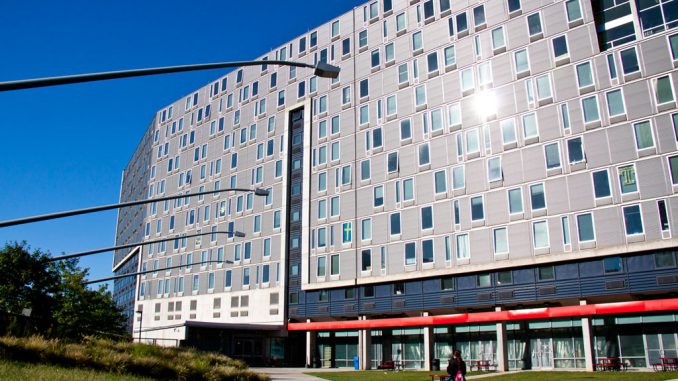
The university will end its official ties with the Edge at the end of this semester, after Temple decided not to renew its contract, Associate Vice President for Student Affairs Michael Scales said.
The anticipated opening of Morgan Hall, which will open 1,275 beds this fall, was the main factor in the university’s decision, Scales said.
The Edge opened in 2006 and immediately started a relationship with the university when Residential Life began leasing approximately 750 beds from Campus Living Villages, the company that operates the Edge.
The university had a one-year contract with the company, with a yearly notification for renewal. Scales said the university has typically made the decision to renew in February.
Through Residential Life, students could rent rooms in the Edge by signing onto My Housing. Beginning this year, students will still be able to lease rooms from the Edge but will have to do so through the Edge’s own services.
The university notified Campus Living Villages that it would not renew the contract through a phone call and follow-up letter, Richard Rumer, associate vice president of business services, said.
In order to determine the number of bed spaces needed, the university develops and reviews a yearly master occupancy plan, which assesses the university’s owned and operated residence halls.
In addition to the properties owned and operated by the university, Temple would lease additional space from buildings owned by private entities – the Edge and Elmira Jeffries.
Elmira Jeffries, which is owned by Philadelphia Management Corporation, houses 140 students, as well as the university’s telecommunications network. Its contract is being continued, Scales said.
Despite complaints from several students about problems with the Edge’s heating, water and electricity, Scales said that the building’s services were not a factor in choosing not to renew the contract.
Alex Ewing, a sophomore business major, and Kenny Roggenkamp, a sophomore English major, are roommates at the Edge who said their experience there for the past two years included problems with the building’s maintenance.
In their first year, the two said that a large crack developed in their bathroom ceiling that was so large that it caused the lighting fixture to fall in. The problem was reported in December and not fixed until April, they said.
Roggenkamp said that maintenance issues at the Edge should be filed “three at a time.”
This year, Ewing and Roggenkamp returned to the Edge and said they had more issues with the heating in their apartment going from very hot to very cold.
“[We returned] half out of laziness, half out of hoping it would get better,” Roggenkamp said.
Scales said that issues are to be expected with any large building, and that Campus Living Villages was equipped to handle such problems.
“It’s been great, they have been great partners, I would not want to give the impression that we are walking away from there with our relationship in poor state. It’s actually in a great state,” Scales said. “I suspect they will continue to do business here well.”
Without a contract with the university, the Edge will become an entity similar to University Village and Oxford Village, which the university has no official business relationship with.
“We have great working relationships [with off-campus providers]. It’s in everyone’s best interest that we continue to collaborate and communicate for the good of Temple students,” Scales said.
Like Morgan Hall, Bright Hope Baptist Church, in association with the Goldberg Group, has begun construction of a new, $100 million, 832 bed facility along 12th Street across from the TECH Center.
Scales said that university has not been in discussion with the project managers about future leasing options, though he stated that the new building will most likely play a role similar to Oxford Village, University Village, and now the Edge.
John Moritz can be reached at john.moritz@temple.edu or on Twitter @JCMoritzTU.



Be the first to comment